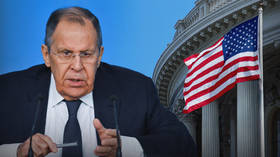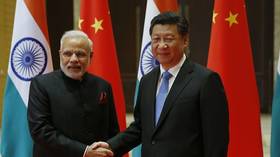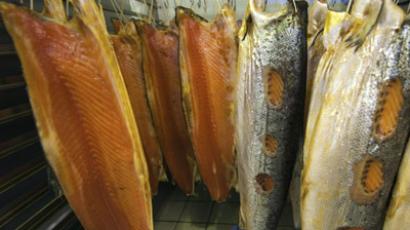Profiting off hunger: Wall Street makes big gains over food price spikes

Powerful firms like Goldman Sachs have made hundreds of millions of dollars in food future trades. Critics accuse them of profiting off starvation and market manipulation, while traders claim their profits are due to increasing consumption in China.
World food prices tracked by the UN Food and Agriculture Organization (FAO) have more than doubled in the past 10 years. The FAO’s Food Price Index, which baskets prices for five prime food commodities, peaked in 2008 and 2011, each time rising more than 50 percent from the previous year. The latest price spike was one of the key factors that triggered the series of uprisings in the Arab world resulting in the fall of several governments.
The year 2013 may see another price hike, following the worst draught in the US in 50 years and poor harvests in Russia and Ukraine. The UN has warned that the world may be approaching a major hunger crisis.
At the same time, the industry is bringing millions in profits to those who rushed to invest in food. Goldman Sachs made an estimated $400 million in 2012 from investing its clients' money in a range of "soft commodities," from wheat and maize to coffee and sugar, according to an analysis by the World Development Movement (WDM)."While nearly a billion people go hungry, Goldman Sachs bankers are feeding their own bonuses by betting on the price of food. Financial speculation is fueling food price spikes and Goldman Sachs is the No, 1 culprit," Christine Haigh of the WDM told the British newspaper The Independent.
The London-based organization – along with similar NGOs like Foodwatch, Oxfam, or Weed (World Economy, Ecology and Development) – have for years blamed financiers for inflating food prices, or for at least making the market dangerously volatile.
They argue that the amount of speculative money is too big in proportion to the physical inventories of the commodities. Deregulation in the late 1990s allowed financial institutions to bet on food prices, resulting in some $200 billion being poured into the market.
For example, hedge fund Armajaro virtually single-handedly sent the global price of cocoa to a 33-year high in July 2010 by buying around 15 percent of global cocoa stocks.
The overall effect of speculation on food prices is an issue of dispute. Influential analysts, such as US economist Paul Krugman, have argued that speculation is a marginal factor compared to rising demand from developing countries, as well as the expanding production of corn and maize for biofuels at the expense of foodstuffs.
A study by the New England Complex Systems Institute last year showed that the Food Price Index should only change if ethanol production had an impact. The study estimated that a 2008 ethanol price hike was largely due to speculation, while a 2011 spike was significantly fueled by investors.
Many financiers dismiss the accusations, and say they will continue bidding against food prices. On Saturday, Deutsche Bank Co-Chief Executive Juergen Fitsche told the Global Forum for Food and Agriculture that Germany’s biggest lender “will continue to offer financial instruments linked to agricultural products.”"Agricultural futures markets bring numerous advantages to farmers and the food industry," he said.
Others seem to be yielding to pressure. Last year, several German banks, including the second-largest Commerzbank, ceased to speculate on basic food prices for moral reasons.













